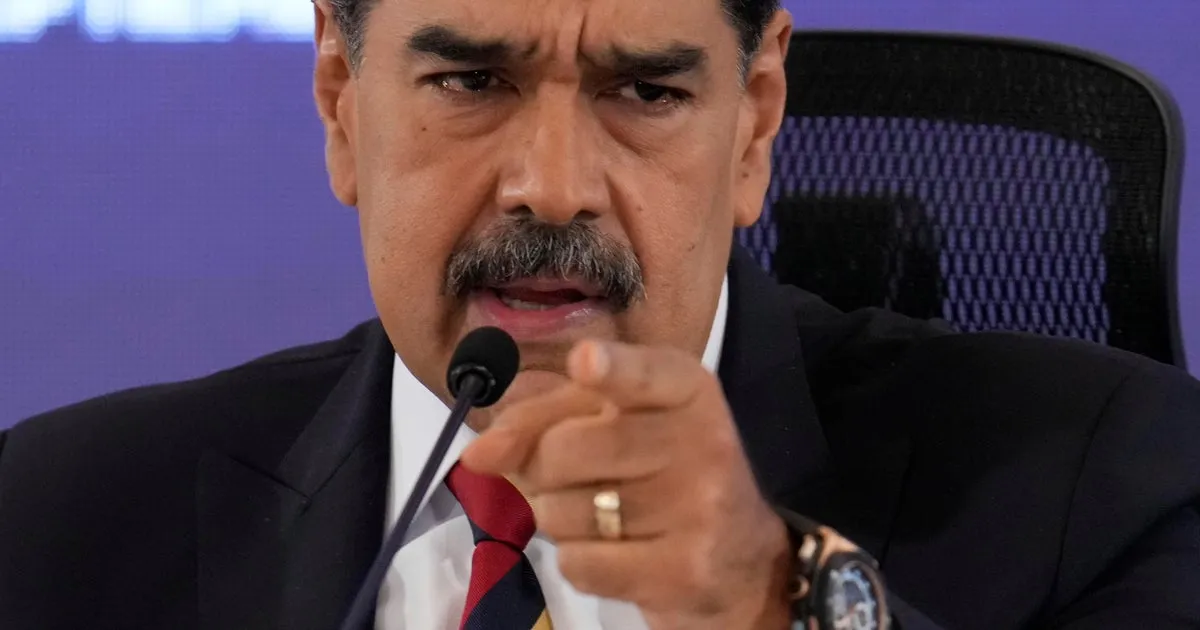
On Monday, Venezuelan President Nicolás Maduro made a bold statement, asserting that he would constitutionally declare a republic in arms if his nation were to be attacked by U.S. forces stationed in the Caribbean. Maduro claimed that eight U.S. military vessels, armed with 1,200 missiles, are currently targeting Venezuela, labeling this military presence as the greatest threat seen on the continent in the past century, according to reports from AFP.
These remarks from Maduro come as the U.S. government plans to bolster its maritime forces in the waters off Venezuela, aiming to combat threats posed by Latin American drug cartels. While the U.S. has not indicated any intention of initiating a land invasion, Maduro's administration has reacted by mobilizing troops along the coast and border with neighboring Colombia. Additionally, the government is encouraging Venezuelans to enlist in a civilian militia to prepare for potential conflict.
In response to what he termed "maximum military pressure," Maduro stated, "We have declared maximum preparedness for the defense of Venezuela." He condemned the U.S. military presence as an "extravagant, unjustifiable, immoral, and absolutely criminal and bloody threat."
The U.S. Navy currently has a significant presence in the Caribbean, including two Aegis guided-missile destroyers, the USS Gravely and the USS Jason Dunham, along with the USS Sampson destroyer and the USS Lake Erie cruiser. Reports indicate that this military presence is set to expand, with the arrival of three amphibious assault ships, which collectively carry over 4,000 sailors and Marines.
This military deployment aligns with President Trump's strategy to leverage military force against Latin American drug cartels, which he accuses of facilitating the flow of fentanyl and other illicit drugs into U.S. communities. The Trump administration has also targeted Maduro, accusing him of leading a drug cartel and increasing the bounty for his capture to $50 million. Despite these tensions, the U.S. has not made any public threats regarding an invasion of Venezuela.
In a recent report, Venezuelan Foreign Minister Yván Gil addressed various Latin American counterparts, asserting that the deployment of U.S. maritime forces is based on a false narrative. He pointed out that 87% of cocaine produced in Colombia is exported via the Pacific, with only 5% transiting through Venezuela. Gil warned that an attack on Venezuela would destabilize the entire region and called for an end to the U.S. military deployment, which he claims threatens the sovereignty of the Venezuelan people.
During the same news conference, Maduro reiterated his belief that he is the legitimate winner of the last presidential election, despite widespread evidence to the contrary that has led several countries, including the U.S., to not recognize him as Venezuela's president. Sworn in for a third six-year term in January, Maduro claimed that his government maintains two lines of communication with the Trump administration, one through the State Department and another through Trump's envoy for special missions, Richard Grenell.
Since the July 2024 presidential election, Venezuelan political opposition leaders have been urging the U.S. and other nations to apply pressure on Maduro to resign. Opposition leader María Corina Machado recently expressed her gratitude to Trump and Rubio for the military deployment, viewing it as a necessary step against what she described as a criminal regime. Conversely, Maduro warned that any U.S. military action against Venezuela would result in bloodshed, stating, "President Donald Trump, the pursuit of regime change is exhausted; it has failed as a policy worldwide."
In summary, the escalating tensions between Venezuela and the United States underscore the complex political landscape in the region, with significant implications for international relations and regional stability. As the U.S. enhances its military presence, the world watches closely to see how Venezuela will respond and what the future holds for this embattled nation.